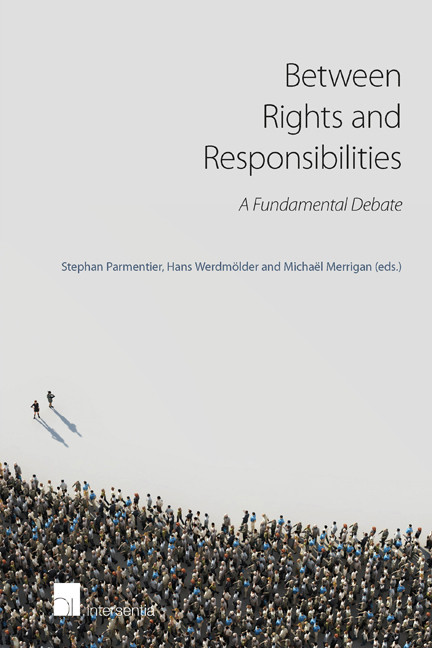Book contents
- Frontmatter
- Foreword
- Contents
- About the Authors
- Introduction: Towards an Integrated Vision of Rights and Responsibilities
- PART I FUNDAMENTAL RIGHTS AND FUNDAMENTAL RESPONSIBILITIES: SETTING THE SCENE
- PART II RIGHTS AND RESPONSIBILITIES IN SPECIFIC CONTEXTS
- Human Rights in a Globalising Economy. Is the Right to Social Protection Qualified by a Duty to Work?
- Human Rights in a Globalising Economy. Rights and Responsibilities of Trade Unions
- Fundamental Rights and Responsibilities within a Multicultural Society
- From Lawless to a Human Rights Approach in the Fight Against Terrorism. The Council of Europe Standards
- Children's Rights at a Dignitarian Horizon of Responsible Parenthood
- Individuals’ Duties in the African Human Rights Protection System. Challenges and Prospects
- Declaration of Human Duties and Responsibilities
Human Rights in a Globalising Economy. Is the Right to Social Protection Qualified by a Duty to Work?
from PART II - RIGHTS AND RESPONSIBILITIES IN SPECIFIC CONTEXTS
Published online by Cambridge University Press: 22 November 2017
- Frontmatter
- Foreword
- Contents
- About the Authors
- Introduction: Towards an Integrated Vision of Rights and Responsibilities
- PART I FUNDAMENTAL RIGHTS AND FUNDAMENTAL RESPONSIBILITIES: SETTING THE SCENE
- PART II RIGHTS AND RESPONSIBILITIES IN SPECIFIC CONTEXTS
- Human Rights in a Globalising Economy. Is the Right to Social Protection Qualified by a Duty to Work?
- Human Rights in a Globalising Economy. Rights and Responsibilities of Trade Unions
- Fundamental Rights and Responsibilities within a Multicultural Society
- From Lawless to a Human Rights Approach in the Fight Against Terrorism. The Council of Europe Standards
- Children's Rights at a Dignitarian Horizon of Responsible Parenthood
- Individuals’ Duties in the African Human Rights Protection System. Challenges and Prospects
- Declaration of Human Duties and Responsibilities
Summary
INTRODUCTION
Socio-economic human rights, including the right to social protection, have been facing multiple ideological challenges in the past two decades. A first challenge comes from the neo-liberal ideological pressures which the European social security systems have experienced, together with growing concerns over financial sustainability. This challenge has been compounded by the financial and economic crises since 2008. A second challenge originates from a cultural relativist debate, often but not exclusively in terms of Asian or African values, which has resulted in a competing discourse on human responsibilities and duties. The cultural relativist debate challenges human rights more in general, but mainly questions civil and political rights. Somehow in line with cultural relativism, there has been an attempt also at establishing a new global ethic which human responsibilities are central to.
As far as the right to social protection is concerned, the first challenge, that is the neo-liberal one with its emphasis on the individualisation of responsibility for social risks, is far more serious than the second one. Neo-liberal policies in Europe, in a context of increasing financial difficulties of social security systems, have confronted the human rights monitoring bodies with restrictive policies and practices in the field of social protection, and necessitated them to cautiously balance economic and social realities with human rights standards. The question that inevitably lurks is whether they have not too much accommodated neoliberalism to the detriment of high human rights standards.
In what follows, brief attention will be given first to the cultural relativist critique and to proposals for a new global ethic based on human responsibilities. The remaining of the chapter will focus on the neo-liberal challenge, as it has emerged in policies and practices. In particular, we will examine how the right to social protection relates to a duty to work. While some attention will be given to the International Covenant on Economic, Social and Cultural Rights (ICESCR) and the ILO Conventions, the main focus will be on the (Revised) European Social Charter ((R)ESC). It will be argued that while an obligation to work may well exist, it does not enjoy the same legal status as the human right to social protection and its composite rights.
- Type
- Chapter
- Information
- Between Rights and ResponsibilitiesA Fundamental Debate, pp. 85 - 112Publisher: IntersentiaPrint publication year: 2016



